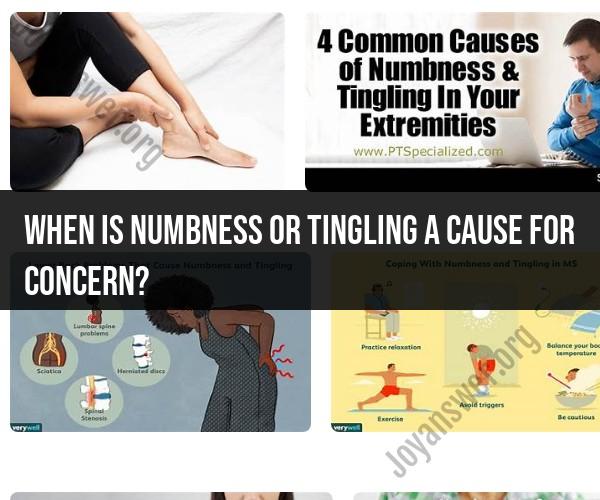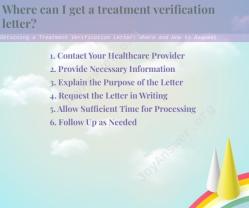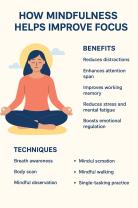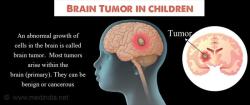When is numbness or tingling a cause for concern?
Numbness and tingling, also known as paresthesia, can have various causes, ranging from temporary and harmless issues to potentially serious medical conditions. While not all instances of numbness and tingling are cause for immediate concern, there are situations where you should seek prompt medical attention. Here are some guidelines on when numbness or tingling may be a cause for concern:
Sudden Onset: If numbness and tingling come on suddenly and are accompanied by other concerning symptoms such as weakness, confusion, difficulty speaking, or loss of consciousness, it could be a sign of a stroke or another serious neurological issue. Seek emergency medical care immediately.
Unexplained and Persistent: If numbness or tingling persists without an obvious cause (e.g., sitting in an awkward position) and lasts for an extended period, it should be evaluated by a healthcare professional. Chronic numbness or tingling may be associated with underlying medical conditions.
Associated Pain: Numbness or tingling accompanied by severe pain, especially if it radiates down an arm or leg, may indicate a nerve compression or injury. This should be assessed by a medical provider.
Numbness in the Face: Facial numbness can be a symptom of various conditions, including dental issues, trigeminal neuralgia, or even a transient ischemic attack (TIA). If facial numbness is sudden and unexplained, seek medical attention.
Multiple Symptoms: If numbness and tingling occur along with other symptoms like muscle weakness, vision changes, speech difficulties, or difficulty walking, it could suggest a neurological disorder or other medical emergency.
Recent Injury: If you have had a recent injury to the head, neck, or spine and experience numbness or tingling afterward, this may indicate nerve damage or spinal cord injury and should be evaluated by a healthcare provider.
Systemic Symptoms: Numbness and tingling that occur in conjunction with systemic symptoms such as fever, weight loss, or changes in bowel or bladder function should be assessed by a doctor.
Underlying Medical Conditions: If you have a known medical condition like diabetes, multiple sclerosis, peripheral neuropathy, or a history of heart disease, numbness or tingling should be discussed with your healthcare provider, as it could be related to your condition or its management.
Medication Side Effects: Some medications can cause numbness and tingling as side effects. If you suspect your symptoms are related to medication, consult your prescribing healthcare provider to discuss alternatives or adjustments to your treatment.
Recurrent Episodes: If you experience recurrent or frequent episodes of numbness and tingling, even if they resolve on their own, it's advisable to consult a healthcare professional to determine the underlying cause and appropriate management.
Remember that numbness and tingling can have various causes, and not all instances are cause for alarm. However, it's essential to pay attention to your body and seek medical evaluation when symptoms are unusual, severe, persistent, or associated with other concerning signs. Early diagnosis and treatment can be crucial in addressing underlying medical conditions and preventing potential complications.
When Is Numbness or Tingling a Cause for Concern?
Numbness and tingling are common sensations that can be caused by a variety of things, including:
- Sitting or lying in one position for too long
- Pinching a nerve
- Carpal tunnel syndrome
- Migraine headaches
- Anxiety or stress
- Certain medications
However, numbness and tingling can also be signs of a more serious medical condition, such as:
- Stroke
- Multiple sclerosis
- Diabetes
- Peripheral neuropathy
- Spinal stenosis
- Brain tumor
If you experience numbness or tingling that is:
- Severe
- Persistent
- Associated with other symptoms, such as weakness, numbness in the face, chest pain, or difficulty speaking
You should seek medical attention immediately.
Navigating Numbness and Tingling: Knowing When to Seek Help
If you are unsure whether your numbness or tingling is a cause for concern, it is always best to err on the side of caution and see a doctor.
Here are some tips for navigating numbness and tingling:
- Keep a record of your symptoms. This will help your doctor to diagnose the cause of your symptoms and recommend appropriate treatment.
- Be honest with your doctor about your medical history and lifestyle. This includes any medications you are taking and any other medical conditions you have.
- Ask questions about your diagnosis and treatment plan. It is important to understand your condition and what you can do to manage it.
Medical Evaluation for Numbness and Tingling: Important Considerations
When evaluating numbness or tingling, your doctor will consider a variety of factors, including:
- Your medical history
- Your symptoms
- A physical examination
- Diagnostic tests, such as blood tests, nerve conduction studies, or electromyography
Once your doctor has diagnosed the cause of your numbness or tingling, they can recommend appropriate treatment.
Treatment for numbness and tingling will vary depending on the underlying cause. In some cases, numbness and tingling may resolve on their own. However, in other cases, treatment may be necessary to manage the symptoms and prevent further complications.
Treatment options for numbness and tingling may include:
- Physical therapy
- Medication
- Surgery
If you are experiencing numbness or tingling, it is important to seek medical attention to determine the underlying cause and get the appropriate treatment.













